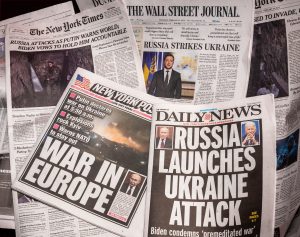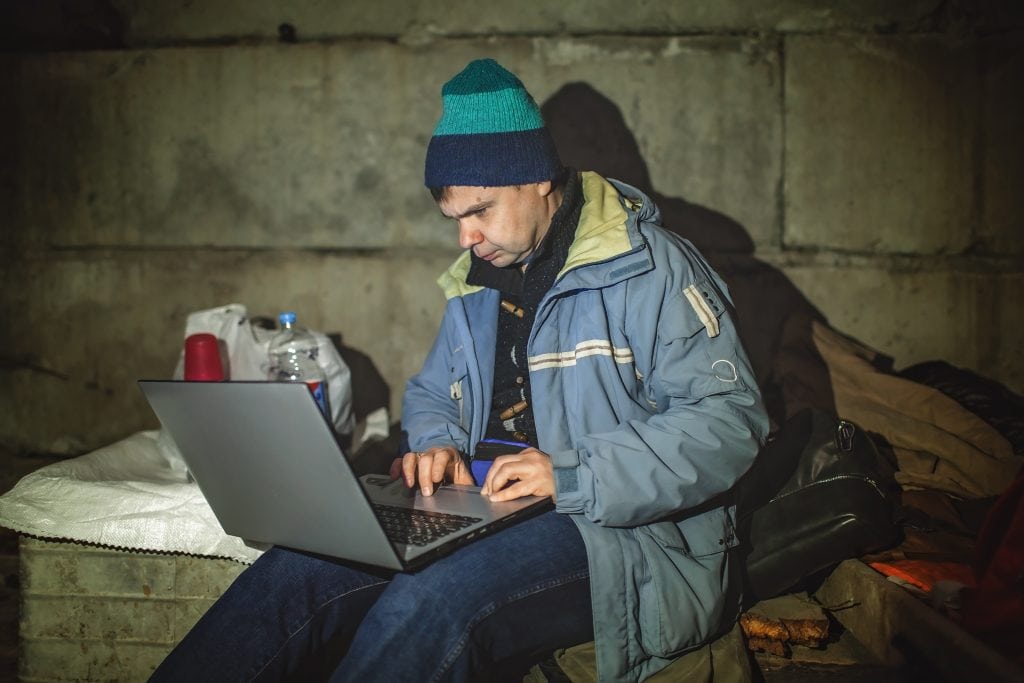Though they often claim to be detached observers, journalists enjoy, even unconsciously, being on the right side of history, fighting the “Good War,” defending the “good guys”. The conflict in Ukraine is an example of what Herbert Gans, in his seminal 1980 essay Deciding What’s News, calls journalism’s “enduring values”. “Some wars are fiendishly complicated and contain multitudinous shades of grey, but this one is (…) easy to characterize as an old-fashioned morality tale of good versus evil, or David against Goliath,” Ben Coates wrote in Politico, 10 days after the Russian invasion.
For most reporters, Ukraine’s resistance to Russia’s aggression has the same moral clarity as other epic struggles, for example against the Somozas in Nicaragua in the 1970s or Myanmar’s military regime today. In Ukraine, many journalists have reacted by rooting for the underdog, lauding the country’s response and resilience. “In the broadest sense, mainstream Western media has been pretty united in denouncing Russia’s invasion,” wrote Jon Allsop in the Columbia Journalism Review. The illegality of the war, the indiscriminate shelling of civilian areas, the commission of war crimes and Western governments’ united front against what they see as Putin’s revanchism have inevitably drawn a clear line in the sand.

New York NY USA – February 24, 2022: New York newspapers report on the previous nights invasion of Ukraine by Russian military forces. Credit: rblfmr/Shutterstock
In early March, Russia’s Minister of Foreign Affairs Sergei Lavrov pushed back, accusing Western media of being “very emotional”, implying that they were biased and unprofessional in their reporting. But emotions and empathy are part of journalism. “Emotion in journalism is important to convey the lived reality of the situation. It gives voice to victims and survivors, but it also acknowledges how these narratives are shaped. This is all crucial for reporting in Ukraine,” Caitlin Knight argued in the Press Gazette.
Neutrality is neither a journalistic custom nor a virtue. Journalists are often partisan. Martha Gellhorn, George Orwell, Robert Capa and Andrée Viollis were not neutral during the Spanish civil war and even less so during the Second World War. “We must always take sides. Neutrality helps the oppressor, never the victim. Silence encourages the tormentor, never the tormented. You can’t ask journalists to stop being human in order to be good journalists,” Auschwitz survivor and Nobel Peace Prize laureate Elie Wiesel famously said. Impartiality doesn’t mean inhumanity. As French-Swiss film director Jean-Luc Godard bluntly said, impartiality does not mean giving “five minutes to Hitler and five minutes to the Jews”.
During the Balkan wars in the mid-1990s, journalists who stayed in Sarajevo embraced what BBC correspondent Martin Bell called the “journalism of attachment”, in solidarity with the besieged population. “Staggered by what they saw, many reporters forged ties to the city. They too had become Sarajevans,” remembered RTL and Le Monde reporter Rémy Ourdan in his book Sarajevo. A Love Story. They too were asking for a military intervention to crush the snipers and the bombers. “Gone was my wandering impartiality. I was for air strikes, for NATO intervention, for arming and training the Muslims,” wrote British war correspondent Anthony Lloyd in his memoir, My War Gone By, I Miss it So.

Kyiv Ukraine – February 27 2022: Ukrainian journalist sits in a bomb shelter with notebook, waits for the end of the air attack of Russian invaders, works and posts the latest breaking news. Credit: Maria Symchych/Shutterstock.
Wars always raise the bar of journalistic responsibility. Ukraine is all the more challenging as it reflects a defining geopolitical shift and is being framed, notes Jason Farago in The New York Times as a culture war, as a clash of civilisations between liberal democracy and autocracy. Who in this context would like to be seen as providing comfort to the enemy?
The early August controversy over Amnesty International’s statement accusing the Ukrainian military of stationing its troops and artillery near hospitals, schools and residential buildings encapsulated the dilemmas journalists are also facing. It did not really revolve around the facts documented by the organisation, nor on the interpretation of these facts under international humanitarian law, but on its impact in the battle of war narratives.
“Without wanting it, the organisation created material that sounded like support for Russian narratives,” said Oksana Pokalchuk, Amnesty International’s Ukraine director who resigned in protest. Seeking to protect civilians, this research instead became, in her view, a tool of Russian propaganda.
A similar dilemma emerged in early May when the New York Times published a story on the assistance US intelligence services had allegedly provided to the Ukrainian military by helping them to target and kill Russian generals. President Joe Biden was livid, according to news reports. The leaks sparked “an internal freak out at the White House”, Politico wrote. Should the New York Times have abstained from publishing information which might have justified Russia’s upping up the ante?
One of the key challenges for journalists covering war has always been to report on facts which will hurt their own “side”. “No one suggests that Ukrainian forces are always heroic. Few participants emerge unsullied from war and it’s clear that Ukraine has challenges that predate the conflict. But impartiality is simply not about publishing on one side, and then on the other,” wrote Bloomberg opinion columnist Clara Ferreira Marques.
Impartiality requires rejecting false equivalences between the aggressor and the victim or between facts and lies. It excludes the convenient and lazy he said/she said approach. But it does not exempt journalists from covering all sides thoroughly and rigorously. Uncomfortable stories which contradict the pro-Western, anti-Russian discourse on the war must also be told.
A June public opinion survey in Brazil, Germany, Poland, the UK and the US by the Reuters Institute for the Study of Journalism found that less than half the respondents thought that the media had provided a “range of different perspectives on the conflict”. Russian disinformation is massive but Ukrainians’ “patriotic storytelling at times takes liberties with reality,” wrote Doan Bui in the French (strongly anti-Putin) liberal weekly L’Obs.
Kyiv may also be taking liberties with media freedom. The Committee to Protect Journalists warned on July 28 about a “draft media law that threatens to restrict press freedom in the country and would move it away from European Union standards”.
Of course, the Western media’s war coverage, despite inevitable flaws, cannot be compared with the Russian media which has been put under total state control. But it is a reminder that in liberal democracies, journalists must distinguish themselves by providing all the news (and opinion) “that’s fit to print”. Their core mission is to help citizens understand what is happening and also to keep their own governments accountable and protect them against self-delusion or hubris.
William Howard Russell, who covered the Crimea war for The Times in the mid-1850s, described war correspondents as the “luckless tribe”. The Ukraine war has again reminded us that it sometimes requires more courage to confront one’s own sympathies, one’s own public opinion or government than to face the enemy’s bullets on the frontlines. As the founder of Le Monde Hubert Beuve-Méry said, “We must tell the truth even when it hurts. Especially when it hurts.”
Jean-Paul Marthoz is a columnist at Le Soir in Brussels and the author of En première ligne. Le journalisme au coeur des conflits [In the front line: Journalism at the heart of conflicts]. This article is the second in a series supported by the Evens Foundation about the ethical challenges facing journalists covering the Ukraine war. The series follows the recent publication of media landscape reports – Building Trust in Journalism in Central Eastern Europe – on Bulgaria, the Czech Republic, Georgia, Hungary, Poland and Slovakia.
Main image: MOSCOW, RUSSIA – JUNE 20, 2019: The President of the Russian Federation Vladimir Vladimirovich Putin at the annual talk with Russian people as seen in a live broadcast on many screens. Credit: Zhenya Voevodina/Shutterstock